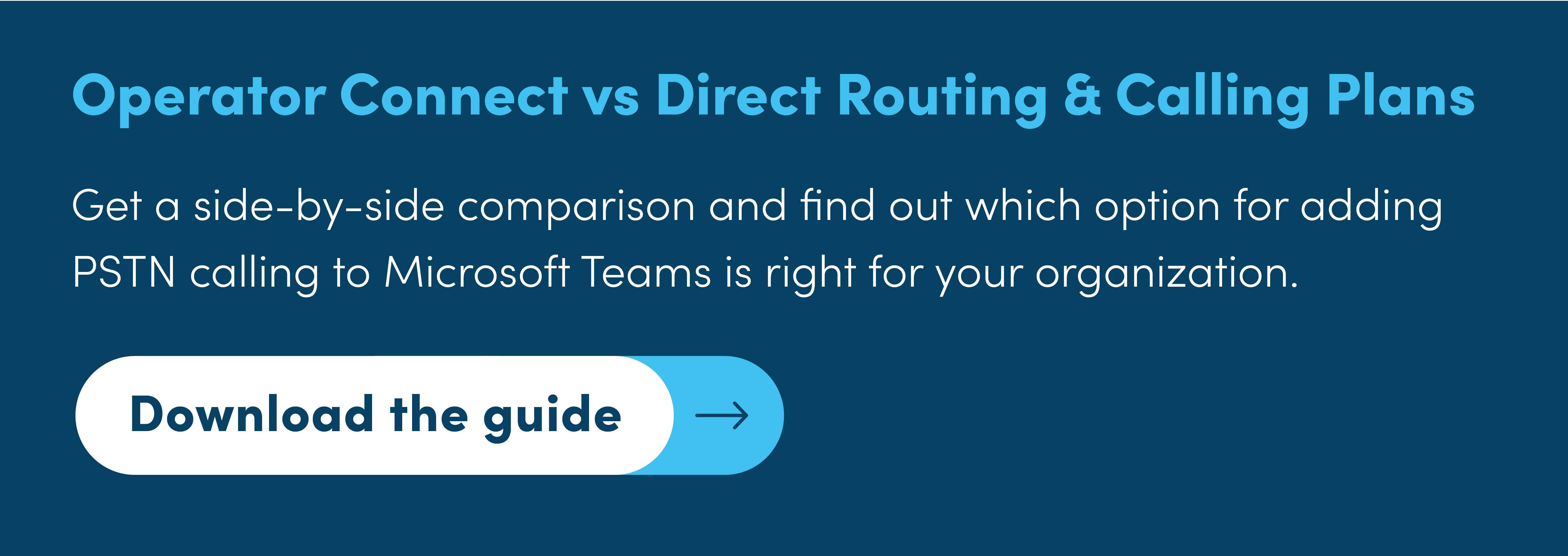Operator Connect is Microsoft’s latest option for adding external PSTN calling to Microsoft Teams. Although it is available directly through the Teams Admin Center, the service works by connecting customers with third party carriers that can provide the necessary voice connectivity. These carriers will all be using the same underlying technology (the Microsoft Azure Peering Service) to connect their networks to Microsoft, but what else is offered as standard?
What is offered as standard on Operator Connect
In short, everything that is provided by Microsoft and their side of the platform will be offered as standard, while the services and support on the supplier side will vary from supplier to supplier.
So that means that, regardless of supplier, you can:
-
- Search for regional coverage and add your preferred supplier from the list
- Assign numbers and profiles to your users through the Teams Admin Center
- Contact Microsoft for support with their interface 24/7
- Manage Operator Connect numbers directly within the 365 Admin center
What services depend on the supplier?
What each supplier will offer as standard will differ depending on the supplier, and that could have a bearing on which provider you decide to purchase your voice services from. There is no requirement for providers on Operator Connect to, for example, offer the same pricing, or the same level of technical support.
So when you are considering a provider, it is advisable to do your research and find the one that can cater to all of your requirements. Here are some questions you can ask to get started:
What is their technical support like?
Is it available by phone? Email? Online ticketing system? Is their first line support team made up of engineers or do issues need to be triaged before you can reach a voice expert? Are they open 24/7? Do they have an online customer portal where you can manage your voice services, download invoices, or raise tickets? These are all important questions you should ask upfront to save yourself from pain points in the future.
What can they integrate with?
Interoperability is only becoming more important, and the more your voice provider can help you get all of your various platforms and systems - like fax machines, PBXs, and contact centers - together in the same cloud environment, the better. It will be easier to monitor, easier to troubleshoot, and easier to manage.
What pricing model will they use?
Per-user per-month contracts are becoming quite common, and can be offered with or without minutes included. If the minutes are bundled in, you need to have a reasonably good understanding of your likely usage or you could pay for more minutes than you need, which rarely get carried forward or credited. Also understand how call duration will be calculated; will a 20 second call be rounded up to the nearest full minute?. These rounding behaviors can have a significant impact on your usage. You should also understand what happens if you go over your amount, especially if you have an unexpected spike in traffic.
Pay-for-what-you-use pricing is exactly what you would expect; you will only be billed for the voice services and minutes that you actually use. That usually includes a nominal monthly rental fee for your numbers and channels, as well as charges for any minutes used. Although it may not come with the convenience of a set monthly price, it is invariably more cost effective, which is why Pure IP offers our customers this pricing. During holiday periods of lower activity, for example, you will not pay the same flat rate offered by the other models. Read more about the pros and cons of different pricing models for voice services >
Can they help you port existing numbers over, or support a cloud migration?
What kind of add-on cloud migration support services can you buy if you want to have a really smooth transition? How are those charged?
If you have special requirements, how flexible can they be?
These could be technical or administrative, such as flexibilities around billing and the set-up of sites.
Can they mix Direct Routing and Operator Connect?
Although the gap between the features in Operator Connect and Direct Routing is shrinking, there are still a few edge cases where you might benefit from having different sets of users in different environments. You might even need completely separate SIP based services, and you want to make sure you choose a provider who can do everything and give you centralized control over all of those numbers regardless of what solution they’re using. Find out more about mixing Direct Routing and Operator Connect >
Alessandra Skarlatos
Alessandra joined Pure IP as the Content and Communications Manager in early 2020, after 5 years within the cinema technology sector.



